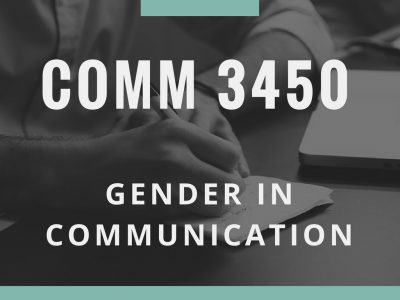 Both Women’s, Gender, Sexuality Studies and Communication students are enrolled in Gender in Communication (COMM 3450) , currently being taught by graduate student Kara Winkler. The course explores the overlap between WGSS concepts and the ways in which humans communicate. Similar to persuasion (COMM 3100), the course allows students to be a part of a semester long group project that creates a campaign to address social issues happening on the UConn campus.
Both Women’s, Gender, Sexuality Studies and Communication students are enrolled in Gender in Communication (COMM 3450) , currently being taught by graduate student Kara Winkler. The course explores the overlap between WGSS concepts and the ways in which humans communicate. Similar to persuasion (COMM 3100), the course allows students to be a part of a semester long group project that creates a campaign to address social issues happening on the UConn campus.
This course was created to help students understand how social and biological constructs intersect and interact to produce gender and to understand how gender influences and is influenced by language, relationships, and communication. By the end of the course, students recognize that gender cannot be fully understood without examining its relationship to class, race, ethnicity, religion, and sexual orientation, while articulating the influence of media in the construction and perpetuation of the meaning of gender.
The Gender in Communication project allows students to create campaigns based on issues surrounding gender. Each campaign brings attention towards an important issue on the UConn campus. Students this semester are focusing on gender stereotypes, intersectional feminism, women’s reproductive rights, women in the workplace, and many more interesting topics. Each campaign is presented to the class and brought to the campus where they are promoted through social media, websites, panels etc. The promotional materials are now filling the campus and internet, gaining many followers for each campaign. Overall, the campaign project is a fun, interactive, and rewarding way to demonstrate understanding of course concepts and also get involved in the UConn community.
Gender plays an incredibly important role in the way we communicate. The course touches upon the influence of culture, language, stereotypes, values, and many more things on our perceptions of gender, and how our perceptions of gender influence all of those things as well. The effects of gender in communication depends on the person and their own experiences and challenges with gender identities, expressions, and expectations. Learning about gender and communication is important for understanding our complex social world. “I think the most important aspect of this course is exposure ideas that challenge previously held beliefs, attitudes, and values that are so deeply ingrained in our society” says Winkler.